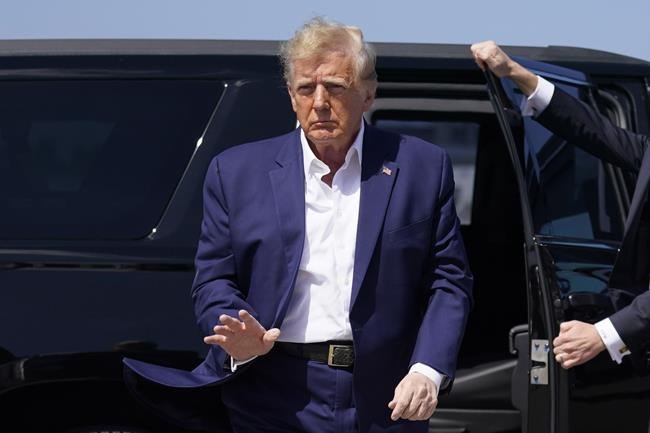WASHINGTON — Donald Trump, the only U.S. president ever to be impeached twice, made even more ignoble history Thursday as he became the first former commander-in-chief ever to be indicted by a grand jury on criminal charges.
In typical Trump style, he wasted no time trying to turn it to his advantage.
"This is Political Persecution and Election interference at the highest level in history," Trump declared in a statement after multiple media reports, citing anonymous sources, broke the news of the indictment.
The charges flow from the Stormy Daniels affair in which so-called "hush money" payments were made during Trump's 2016 presidential campaign to silence claims of extramarital sexual encounters.
The indictment remains sealed, but the Manhattan district attorney's investigation was focused on payments that were made to Daniels, a porn star, as well as to former Playboy model Karen McDougal.
Trump described the indictment as "unthinkable" and himself as a "completely innocent person."
"Never before in our nation's history has this been done," he said.
"Weaponizing our justice system to punish a political opponent, who just so happens to be a President of the United States and by far the leading Republican candidate for President, has never happened before. Ever."
"By far" might be a stretch, but recent polls do suggest the growing judicial storm around Trump has been putting wind in his political sails, and that his closest rival for the Republican nomination — the not-yet-declared Florida Gov. Ron DeSantis — is losing ground.
DeSantis tried a pre-emptive strike Thursday, calling the indictment "un-American" and vowing that Florida "would not assist" any extradition efforts, should a formal request become necessary.
"The weaponization of the legal system to advance a political agenda turns the rule of law on its head," he said.
The next step will be an arraignment — and media reports suggest Trump will be given the opportunity to surrender to authorities in New York, likely next week.
Whether or how he might turn it into a moment of political theatre remains to be seen.
House Speaker Kevin McCarthy, long an important Trump ally on Capitol Hill, promptly issued a statement that dovetailed nicely with the former president's emerging narrative — even if it didn't mention him by name.
McCarthy framed the indictment as "an outrageous abuse of power" rooted in little more than "political vengeance," and vowed to get to the bottom of it.
"I'm directing relevant committees to immediately investigate if federal funds are being used to subvert our democracy by interfering in elections with politically motivated prosecutions," he tweeted.
Also weighing in was Kari Lake, the failed candidate for Arizona governor whose 2022 campaign often seemed a carbon copy of the Trump playbook, right down to refusing to accept the final results.
In a statement, Lake called the indictment "a dark moment in the history of our nation" and urged both Republicans and Democrats to condemn it.
"The precedent this sets threatens to further divide a country that already seems to be on the verge of tearing itself apart."
Both had their sights set squarely on Manhattan district attorney Alvin Bragg, who is taking on the case despite the fact two previous groups of prosecutors had already decided against it.
It wasn't immediately clear whether Trump supporters were planning any protests, something that had been widely anticipated when the former president himself predicted last week that his arrest was imminent.
But ever since legions of his supporters laid siege to the U.S. Capitol on Jan. 6, 2021, whipped into a frenzy by his relentless claims of a stolen presidential election, the prospect of a pro-Trump gathering puts law enforcement on alert.
Police in New York had issued an all-hands-on-deck notice for Friday in anticipation of possible protests, CNN reported.
The fate of the hush-money investigation seemed uncertain until word got out in early March that Bragg had invited Trump to testify before a grand jury, a signal that prosecutors were close to bringing charges.
Trump’s attorneys declined the invitation, but a lawyer closely allied with the former president briefly testified in an effort to undercut the credibility of Trump’s former lawyer and fixer Michael Cohen.
Late in the 2016 presidential campaign, Cohen paid Daniels $130,000 to keep her silent about what she says was a sexual encounter with Trump a decade earlier after they met at a celebrity golf tournament.
Cohen was then reimbursed by Trump’s company, the Trump Organization, which also rewarded the lawyer with bonuses and extra payments logged internally as legal expenses. Over several months, Cohen said, the company paid him $420,000.
Earlier in 2016, Cohen had also arranged for the publisher of the supermarket tabloid the National Enquirer to pay Playboy model Karen McDougal $150,000 to squelch her story of a Trump affair in a journalistically dubious practice known as “catch-and-kill.”
The payments to the women were intended to buy secrecy, but they backfired almost immediately as details of the arrangements leaked to the news media.
Federal prosecutors in New York ultimately charged Cohen in 2018 with violating federal campaign finance laws, arguing that the payments amounted to impermissible help to Trump’s presidential campaign. Cohen pleaded guilty to those charges and unrelated tax evasion counts and served time in federal prison.
This report by The Canadian Press was first published March 30, 2023.
— With files from The Associated Press
James McCarten, The Canadian Press




